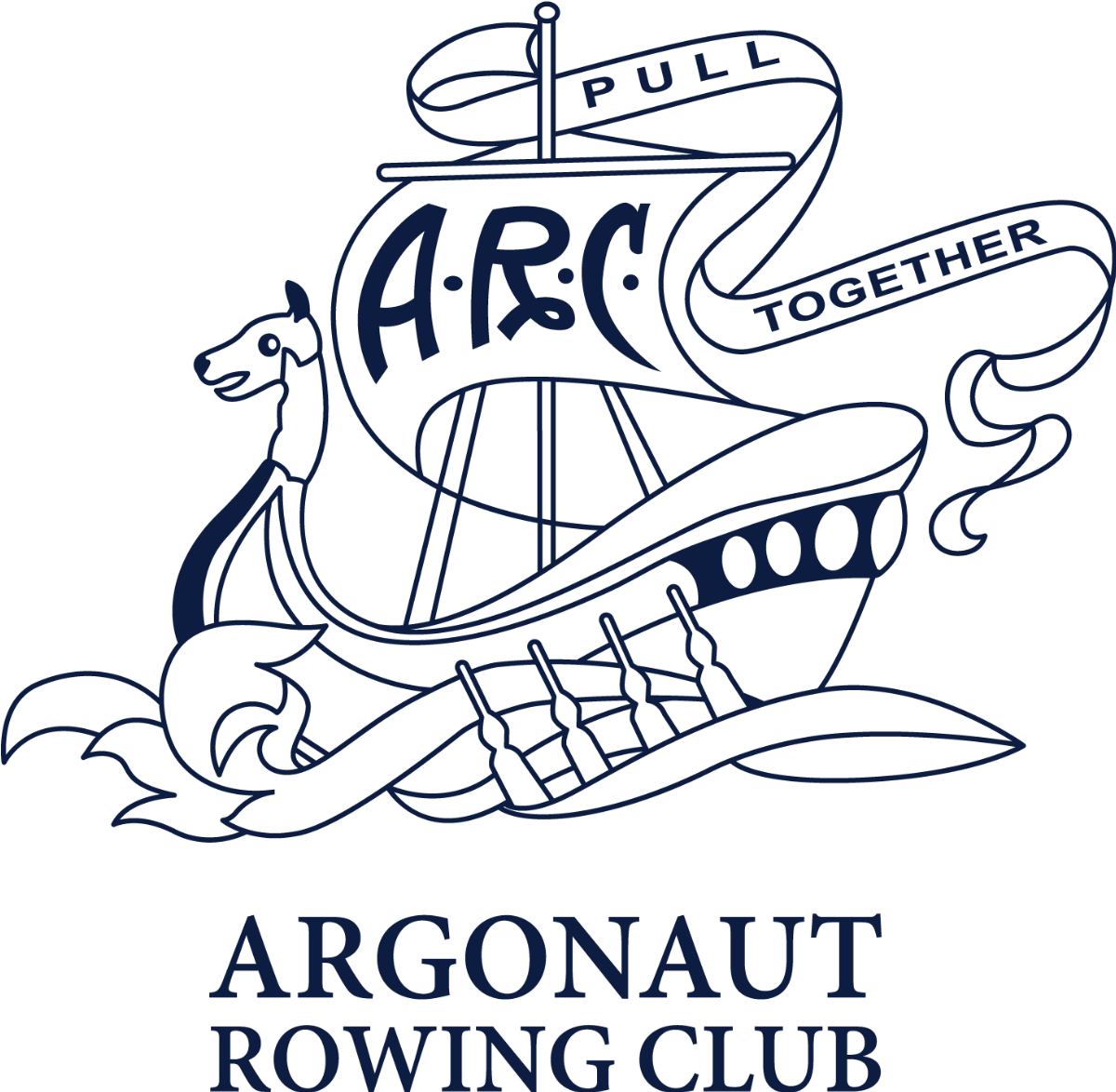Argonaut Olympian Issue #8
We are in the midst of honouring our past and present Olympians by documenting their achievements and establishing a permanent archive. An Argonaut Olympian is an athlete who has been a competitive member of the club prior to competing at the Olympic games. Until 1972, athletes represented their club as well as their country at the Olympics. In 1976 a National Team system was developed in Canada, thus ending club representation at the games. Other than footnoting this difference, there is no other discrepancy between the two systems for the purpose of this exercise.
The Argonaut Rowing Club has produced more Olympic crews than any other club in North America, while that system existed, fielding a total of thirteen crews. Many other members have competed in National Team programs and have been winning gold medals at the Olympics and World Championships with consistency for nearly three decades. This is the eighth of the series, compiled non-chronologically, of our athletes that have donned the double blue and gone on to compete in the Olympic Games.
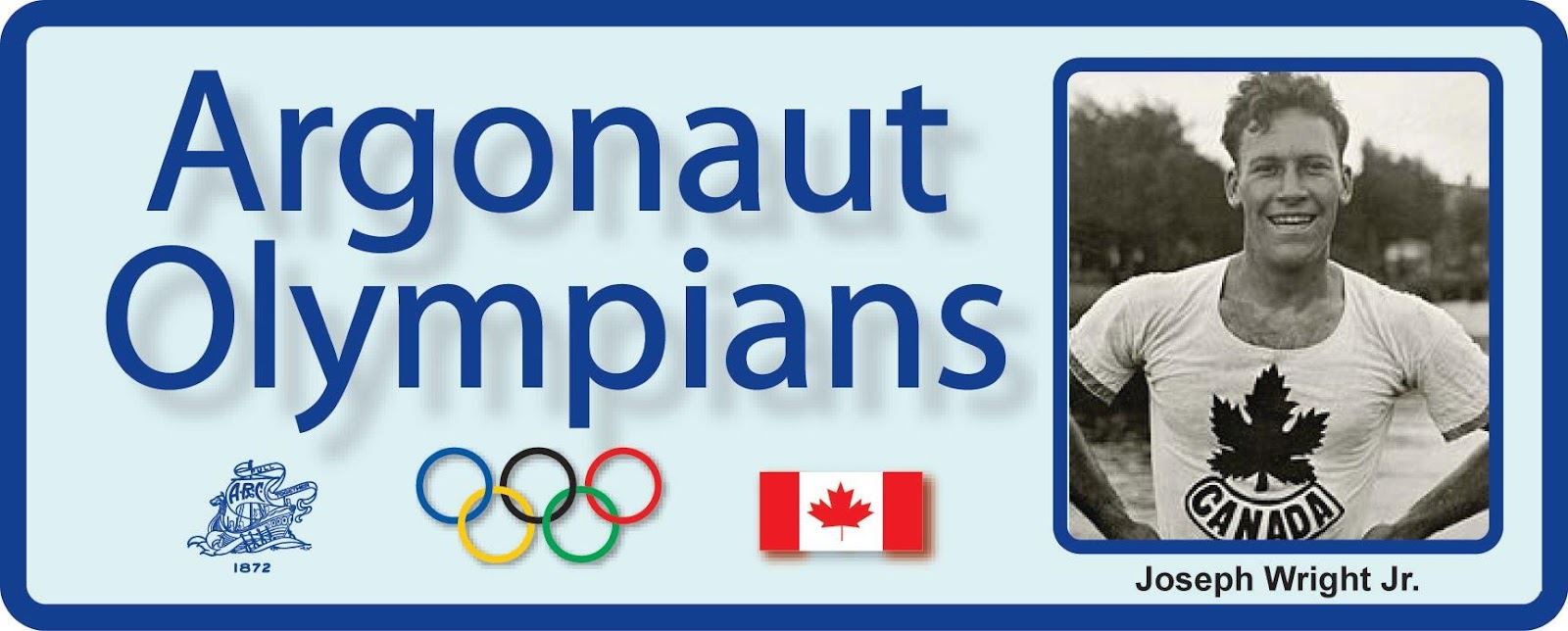
Part 8 – Joseph Wright Jr. – 1928 Amsterdam Olympics, 1932 Los Angeles Olympics Games of the IX & X Olympiads
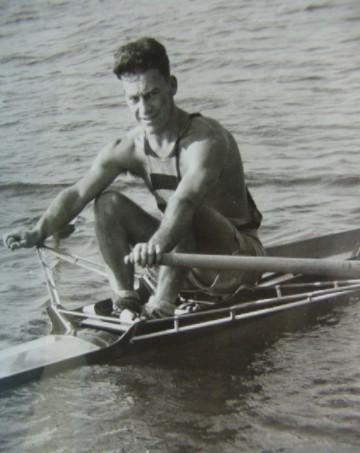 Joe Wright Jr. training at Argonaut Club circa 1927.
Joe Wright Jr. training at Argonaut Club circa 1927.
With one of world's greatest oarsmen and coaches as your father, Joe Wright Jr. had big shoes to fill if he chose rowing as his sport. But that, along with Argonaut football, is exactly what he did in establishing himself as one of the best scullers on the planet in the pre-depression era of rowing. What Joe Sr. was to sweep rowing, a powerful workhorse rowing mostly crew races, Joe Jr. was the lithe thoroughbred with a finesse more suited to sculling. And for a few years, possibly no one in the world, except maybe Bobby Pearce, could beat him. Joe Sr. garnered countless headlines, but Joe Jr. had a few too:
“Joe Wright All-Time Sculling 'Great'", “Wright Among World's Best”, “Headed for Olympics", "Wright Presented with 'Olympic Shield of the Athlete', "Two Joe Wrights Enriched 75 Years of Canadian Sport"
While his dad excelled at everything from track and field to swimming and boxing beyond his rowing career, Joe Jr. played Argonaut football and rowed, and that he did very well. Joe Sr. was a famed oarsman and equally so as a coach, also his son's coach, in a stellar career spanning over four decades. Joe Jr.'s career was more like that of a supernova. He began rowing in 1924 at age 18 and began peaking just three years later at 21. That year he was a few strokes away from winning English Henley’s1927 Diamond Challenge Sculls when he snagged a rope and lost the race.
Rowing Career and Argonaut Football
Joe Wright Jr. didn't win anywhere near the 137 titles his father did over the decades but in the 1927-29 era virtually no one in the world could beat him. The Diamond Sculls cup awarded to the fastest male sculler at English Henley was considered adequate evidence that you were the world's fastest sculler as there was no amateur, only professional, world championships in those days. Professional races were much longer, more like head races of 3-5 miles with tens of thousands of spectators betting huge sums of money on the races. While young Joe didn't win in England in '27 he was the fastest boat at the regatta until he snagged a boom rope with a substantial lead a few metres from the finish and had to settle for second place. He left no doubt in '28 when he beat Jack Guest and became the first, and only, Argo in history to win the coveted event. The difference in competition in the generation since Joe Sr. is important historically as transatlantic travel for sport was rare in the early part of the 20th century and the rowing regatta at Joe Sr.'s St. Louis Olympics was really a North-America-only event whereas 19 nations competed in rowing at the Amsterdam Olympics in 1928. By 1932 Joe had married and the rowing spark was gone as quickly as it came as he did not qualify for the final in the single at the Los Angeles games marking the last big international race in his rowing career. He continued to play football for the Argonaut Football Club and this led to a Grey Cup victory in 1933 with Joe Jr. playing in the center position and in the game had three interceptions. This was the highlight of a 11-year Argonaut football career spanning from 1924-33 and 1936. Our rowing club started the football club in 1873 as a means for rowers to stay in shape in the off-season and we maintained ownership of it until the 1950's when it was sold for approx. $400,000.
The 'Pearce' in the Room
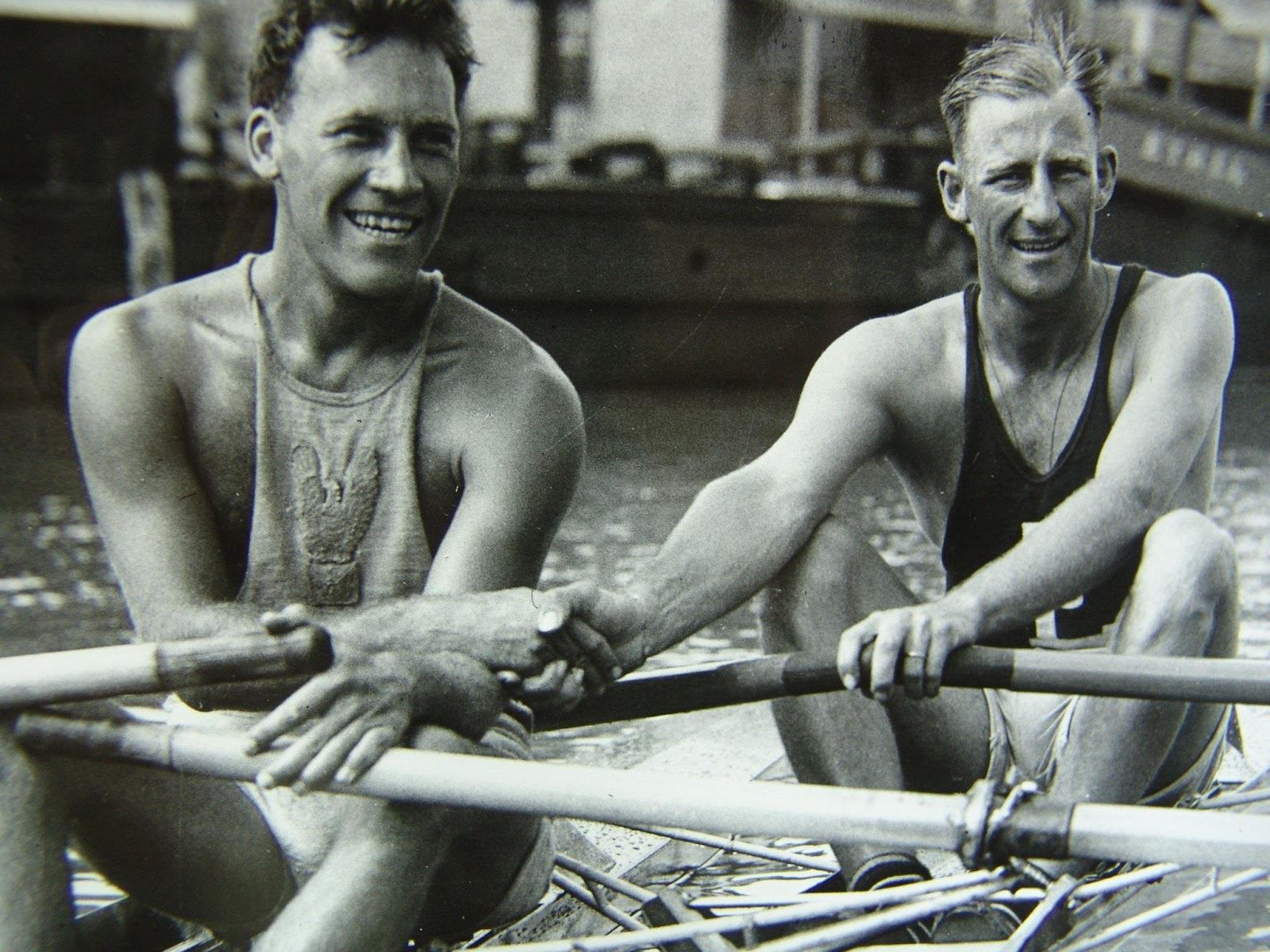 Famous handshake - Joe Wright Jr. and Bobby Pearce shake hands at the 1928 Olympic Games.
Famous handshake - Joe Wright Jr. and Bobby Pearce shake hands at the 1928 Olympic Games.
Many would have trouble hearing claims of Joe Wright Jr. as the world's greatest in the era of Bobby Pearce - the big Australian who moved to Canada and won Olympic gold in the single sculls in '28 and '32 (for Australia), and won the Diamond Sculls in '31. He also won three professional World Championships and was presented with the Lou Marsh Trophy in '38 when he retired undefeated. In 1950 Joe Wright Sr. beat Pearce in a narrow vote to become Canada's athlete of half century. But at the 1928 Olympics Pearce won gold and Joe Jr. didn't make the final. Rowing progressions however, were more complicated then with heats, two repechages, quarters, semis, and finals and Joe Jr. made the mistake of entering three events over a week of racing. This might not sound overwhelming, especially since he was a spare in the eight, however his doubles event with partner Jack Guest ran the gamut and they had to race six times before a winner was decided. Add in four singles races and Joe Jr. found himself double racing on several days. Joe's ego might have got the best of him as he was the only rower out of 245 at the regatta to enter more than one rowing event at Amsterdam. The outcome might well have been different had he focused on the single only to take on Pearce with fresh legs.
This excerpt is from Joe Jr.'s Canadian Sports Hall of Fame Story:
His performance at the Canadian Henley was particularly notable, as a tight schedule left him with a seemingly impossible task. Wright was set to compete against American champion Garret Gilmore in the quarter-mile race and then, less than half an hour later, square off against Pacific Coast champion, Adams, in the 550 yard event. Even Joe, Sr. was doubtful as to whether his son could pull through two gruelling back-to-back events against the best rowers on the continent. Before the race, Joe calmly declared: "I'll tell you what I'll do. I'll go out and win the quarter mile from Gilmore and when that's over, I'll lick Adams." And so he did.
March 28, 1906
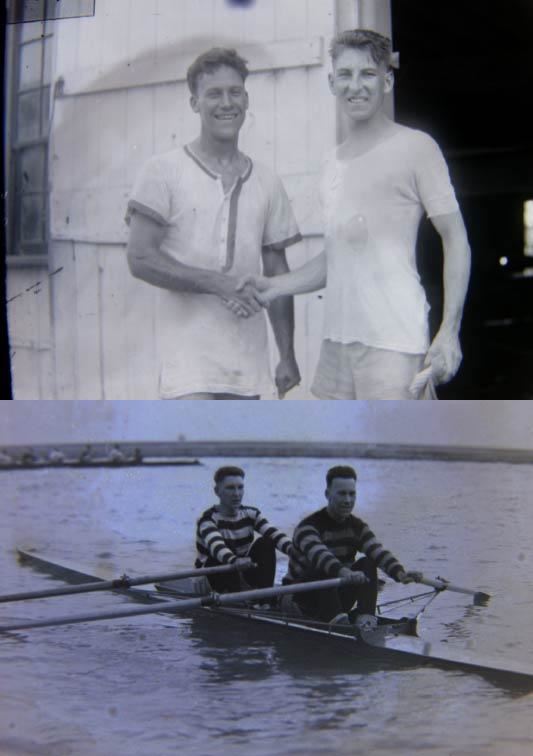 Joe Wright Jr. (left, stroke) and Jack Guest at Argos preparing for 1928 Olympics.
Joe Wright Jr. (left, stroke) and Jack Guest at Argos preparing for 1928 Olympics.
It's a beautiful thing when the stars align and that they did on this date in 1906 when both Joe Wright Jr. and Jack Guest were born in Toronto, within hours of each other, and would become two of the top scullers of their era. Twenty-two years later they would both be rowing at the Argonaut Club and entering the double winning silver at the Olympics. Both Jack Guest and Joe Wright Jr's fathers were coaching and heavily involved in the interests and success of their progeny. Word has it that the Guest camp was not happy with Joe Wright Jr. rowing the single at the Amsterdam Olympics (Guest did not) as it added several additional races to the six heats and finals they had to race in the double. Favoured to win gold, they had to settle for silver and Wright failed to medal in the single due to the fatigue of competing in 10 races within a week. This led to a split after the Olympics and Guest moving to the Don Rowing Club, which he represented in his 1930 Diamond Sculls victory.
The Peerless Four
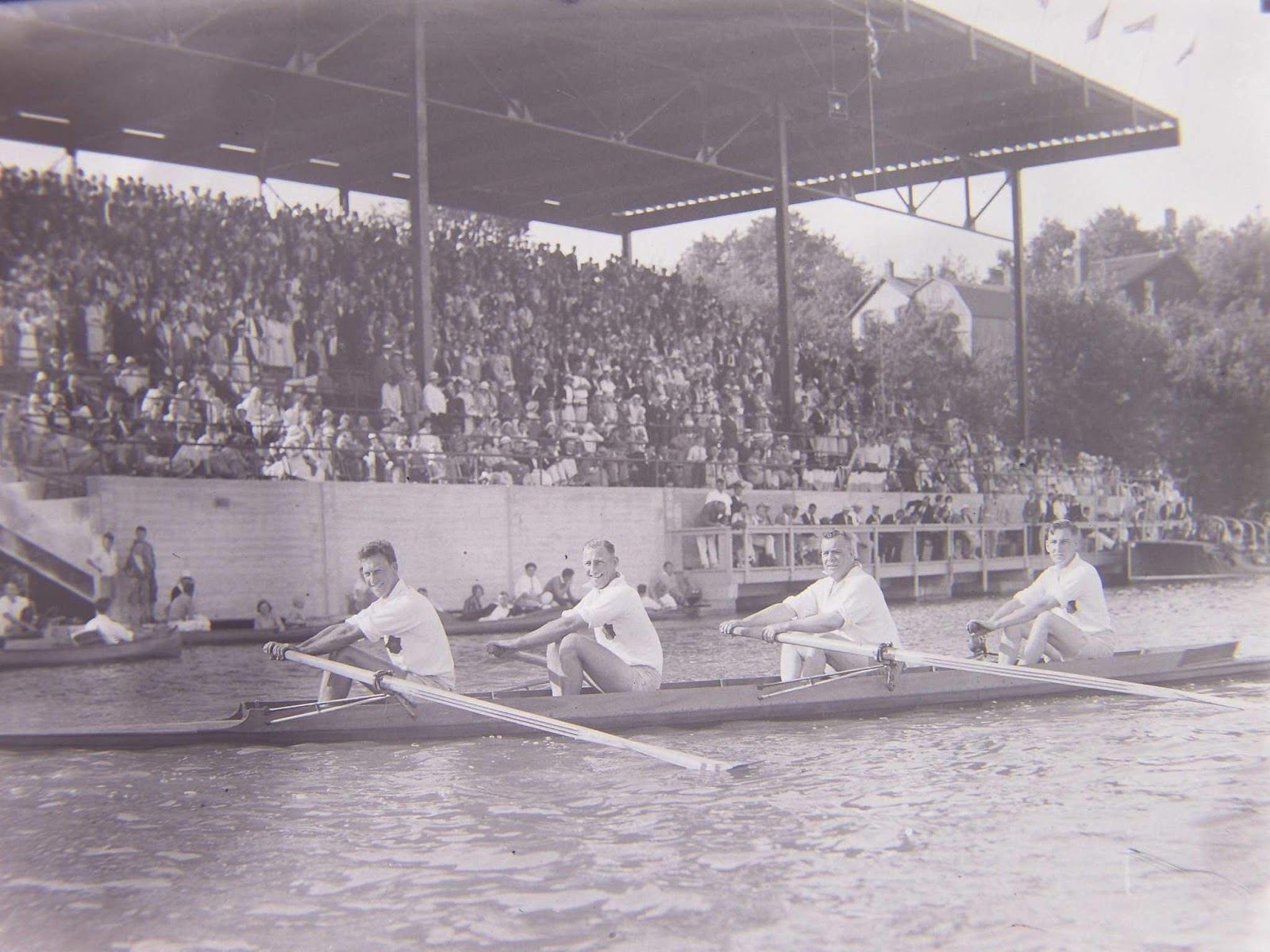 Joe Wright Jr., Bobby Pearce, Lou Scholes, Jack Guest row past the new Henley grandstand in St. Catharines, ON to a standing ovation in 1931.
Joe Wright Jr., Bobby Pearce, Lou Scholes, Jack Guest row past the new Henley grandstand in St. Catharines, ON to a standing ovation in 1931.
In the time of Joe Wright Jr., the world's best scullers were Canadian, or lived in Canada. The 'Peerless Four' were four Diamond Sculls winners at English Henley; the only four in Canadian history and all from the same era. Lou Scholes won in 1904, Wright in 1928, Guest in 1930, and Pearce in 1931. While Bobby Pearce lived in Canada, he was an Australian citizen at the time. The Henley Royal regatta however, tags clubs, rather than nationalities, for victories so thePeerless Four represent the only four Canadian club wins in the 173 year history of the Diamond Sculls at English Henley.
Fifty years after Joe's Diamond Sculls win a special ceremony was held to present him with a medal called "The Olympic Shield of the Athlete" in early 1979. Then Minister of Sport and Fitness, Iona Campagnola said: "Your experiences have had a very profound effect on Canada's rowing community and indeed on the Canadian community at large ... your contributions of yesteryear have given our rowers of today strong traditions on which to build."
A few Argos still remember Joe Jr. Both George McCauley ('52 Olympic crew) and Zeke O'Connor ('52 Argo Grey Cup winner) remember his feistily, fun-loving temperament and his zest for life. Like his dad, his persona was larger than life in those days where a Diamond Sculls win would get you a ticker-tape parade on Bay St. and tens of thousands showing up to celebrate with you. Joe Wright Jr. married three-time Olympic swimming Champion Martha Norelius in 1930 and they had a daughter Dianne who still lives in Toronto and she had seven children of her own. Joe later divorced Martha and married Dorothy Nicholson. Joe fell ill at times in his rowing career and later in life suffered from serious ailments from 1974 until his death in 1981. His earlier illness in the 30's might have ended his rowing career sooner than he wished, but for a while young Joe went supernova and the world basked in his light.
So who was the greater rower, Joe Junior or Senior? Check out Joe Wright Sr.'s feature on the website decide for yourself!
Medal Count - Rowing Events – Games of the IX Olympiad – Amsterdam, NLD
| |
Gold |
Silver |
Bronze |
Total |
| USA |
2 |
2 |
1 |
5 |
| Great Britain |
1 |
2 |
1 |
4 |
| Canada (7th) |
0 |
1 |
1 |
2 |
Medal Count - Rowing Events – Games of the X Olympiad – Los Angeles, USA
|
Gold |
Silver |
Bronze |
Total |
| USA |
3 |
1 |
0 |
4 |
| Great Britain |
2 |
0 |
0 |
2 |
| Canada (8th) |
0 |
0 |
2 |
2 |
BIO & Selected Notable Rowing Achievements
- 1906 - Born in Toronto, March 28th
- 1924 – Joined Argonaut Rowing Club
- 1924 - Gold, C.A.A.O Champs Sr. Men's 8+
- 1925 - Gold, U.S. Middle State Regatta, Sr. Men's 8+
- 1925 - Gold, American Henley Jr. 1X - Record set
- 1925 - Gold, American Henley Int. 1X - Record set
- 1925 - Gold, American Henley Sr. 1X - Record set
- 1927 - Canadian National Champion, Men's 1X
- 1927 - American National Champion, Men's 1X
- 1927 - 2nd, Henley Royal Regatta, Diamond Sculls 1X
- 1928 - Gold, Henley Royal Regatta, Diamond Sculls 1X
- 1928 - Silver, Amsterdam Olympics, Men's 2X *
- 1928 - Bronze, Amsterdam Olympics, Men's 8+ *
- 1928 - 5th, Amsterdam Olympics, Men's 1X *
- 1929 - Competed, Henley Royal Regatta, Diamond Sculls 1X
- 1930 - Competed, Henley Royal Regatta, Diamond Sculls 1X
- 1932 - Competed, Los Angeles Olympics, Men's 1X
- 1924-36, Toronto Argonaut Football Club, Center position
- 1930 - Married, Martha Norelius, 3X Olympic swim champion
- 1933 - 21st Grey Cup Champions, Center position
- 1955 - Inductee, Canada’s Sports Hall of Fame in 1955.
- 1979 - Presented with the "Olympic Shield of the Athlete"
- 1981 - Died June 7th, in Toronto
*Wright was the only oarsman to compete in multiple events at 1928 Olympics.
Grant Sommers 2017
